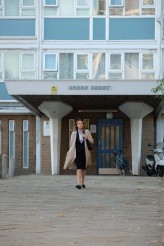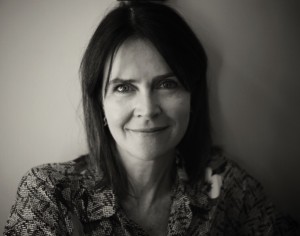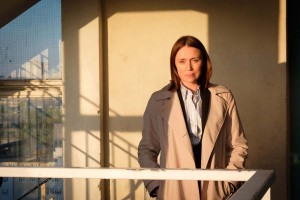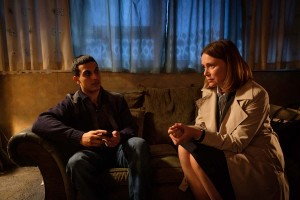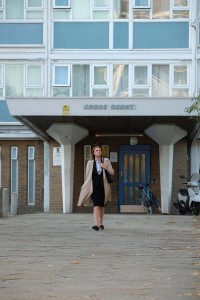HONOUR is a fact-based drama that follows the investigation, led by British police detective Caroline Goode (played by Keeley Hawes, also one of the executive producers) into the 2006 disappearance of Banaz Mahmod (Buket Kamur). Goode’s inquiry leads her to learn about the disturbing practice of “honor killings,” which consist of men murdering women, often family members, for perceived infractions against patriarchal culture.
HONOUR executive producer Liza Marshall has an extensive career in both narrative and documentary films and television. Her previous work includes the RED RIDING films, WELCOME TO THE PUNCH, SPRINGSTEEN AND I, TABOO, and RIVIERA.
Speaking by phone from England, Marshall talks about the making of HONOUR.
ASSIGNMENT X: When did you first become aware of this investigation?
LIZA MARSHALL: Well, it was quite a long time ago. It was about six years ago that I watched Deeyah Khan’s documentary [BANAZ: A LOVE STORY] about the Mahmod case. I was aware of it anyway, because it got a lot of attention here when it happened. And when I watched the documentary, I just thought it could make a really powerful and inspiring drama. So, I approached [writer] Gwyneth Hughes, and we started developing a script. And then it took a long time to get anyone to agree so make it. So, it was a long road, and Gwyn did an incredible job of researching it, and talking to everybody involved. She spoke to every single person [depicted in HONOUR]. So, the whole project took a long time to come to fruition, and then, ITV and Britbox stepped in, and we were able to make it, with Keeley, which was great.
AX: HONOUR premiered on ITV in the U.K., and was shown in multiple parts, but on Britbox, it’s shown as a single film …
MARSHALL: It’s in two parts in the U.K. It did very well. We got 6.7 million viewers, which is really high, and great reviews. And it really struck a chord, I think, because in the first [COVID-related] lockdown, certainly, and I’m sure it continues in the U.K., there’s been a real rise in domestic violence numbers, with everybody locked inside. I think there’s something about the story that tapped into the zeitgeist. We found a lot of people were talking about it, which was great.
AX: Is the reason that the real-world case covered in HONOUR got so much press at the time is that this was the first one of these that was successfully prosecuted in Britain, or because of the difficulty of finding the evidence?
MARSHALL: I think it was such a horrific crime, when it happened, and then the actual case, it took about three years to get the [perpetrators]. And so, there were various stages when it got a lot of publicity. I think what Caroline achieved was really extraordinary. It was the first successful prosecution of honor-based violence in the U.K. So, it felt like quite a milestone, because [honor-based violence] is such a hidden crime, and so many people are afraid to come forward. So, it was a pretty landmark case here in the U.K.
AX: You said it took a long time to get it made. Why were the networks so hesitant?
MARSHALL: I don’t know. It’s a tough subject, and I think ITV has done a lot of true crime, but interestingly, this was the first true-crime story that had a female detective at its heart. It does seem quite extraordinary, actually. I think some subjects just have to find the right moment, and there has to be a reason to tell the story. It began life as a single film, and that format is really difficult. People don’t want one two-part so much anymore. People want returning series. And you couldn’t tell this story in that format. So, maybe that was it as well. But I also think it’s not a straightforward case, and maybe some broadcasters were nervous about that. But anyway, in the end, we made it, so that’s great.
AX: The investigator is white, and both the victim and the perpetrators are Iraqi Kurdish Muslim immigrants to England. Were there any concerns about how HONOUR would play to and/or impact the Muslim community?
MARSHALL: Yeah, absolutely. We worked very closely with various different charities, and it’s not a crime that happens exclusively in Muslim communities. It happens in lots of different cultures. For me, the film was always much more about misogyny than it was about religion, because they just wanted to rub Banaz out. She just wasn’t very important to them, and it was all about the men’s honor. I guess that’s why Gywn and I were so motivated to tell the story, is that we just didn’t want Banaz to disappear, we wanted to create a film that honored her, so her absolutely horrific death wouldn’t go in vain, and it would make some kind of difference, and make people aware of this crime. So, yes.
AX: Is there some kind of database about how many of these cases happen every year, and is it getting better, or getting worse?
MARSHALL: Unfortunately, it’s getting worse. We work with a charity called Karma Nirvana, and I haven’t got the statistics right in front of me, but I think it’s maybe three hundred deaths a year. I’d have to double-check that, but it’s such a hidden crime that often girls just disappear, and then you don’t know what’s happened to them. I’m just looking at them now. There’s a lot of information on their website about what they do.
AX: How did Keeley Hawes become involved with HONOUR?
MARSHALL: She was the first actress that we sent the script to, actually, because I knew her a little bit, and I know her agent very well. She just completely fell in love with it, and we always thought she would be brilliant. And she loved it so much, she wanted to come aboard with her production company, which was great. For me, I think it’s the best performance that she’s ever given. I think she’s so great, and it was her decision to go with no makeup, with her roots slightly showing, and just really inhabiting Caroline. She actually played it slightly differently. The real Caroline is much shorter than her, and very nicely turned out, and wears heels a lot. But if you put Keeley in a costume like that, she looks ridiculously glamorous, and not very believable as a policewoman. So, we worked very hard on her look. And she’s completely passionate about the film, and a great supporter of it.
AX: Caroline Goode is a consultant on HONOUR. What sort of advice did she have for you?
MARSHALL: Gwyn spent a huge amount of time with her, going through every stage of the case. The case was obviously much, much more complicated, and there were certainly more dead ends, than we depict in the drama. And so, they spent many, many hours going through every single detail of the case, and going over what happened, and compressed that into a story. She read drafts of the script, and she came to the set a couple of times, which I think was very exciting, but also very weird [for Goode], to see your own life being dramatized. And yes, she’s been involved a lot, and she’s a really good [supporter] of the film. Other people being depicted came to the set with her as well.
AX: Did you or Gwyneth Hughes interview any of the perpetrators?
MARSHALL: No.
AX: Did either of you speak with Bekhal, played by Rhianne Barreto, Banaz Mahmod’s sister, who is in Witness Protection?
MARSHALL: Yes. Gwyn talked to her a lot while we were developing the script, and then we couldn’t get in touch with her, obviously, because she was in Witness Protection. But finally, she rang us, and she’d seen the film, and she absolutely loved it. She was very pleased with the way that she was depicted, and even though it was an incredibly challenging watch for her, she was really, really happy with the film, which was great. And we also had a very positive response from Payzee, who was one of the other sisters, who also – I wouldn’t say “liked” the film, because I think it’s a horrible experience to have to watch it for them, but very much is a supporter of the film, and uses it to talk about her charity work. We didn’t really know about her initially, because she got in touch with us after we’d written the script. So, we focused on Bekhal in the drama. There were other siblings.
AX: Where did you shoot?
MARSHALL: We shot it all around London. We didn’t shoot in exactly the same places, because we didn’t feel that would be respectful to Banaz’s memory. So, they look quite similar. We didn’t obviously shoot in the real house, or anything like that.
AX: Did you shoot during COVID?
MARSHALL: No, luckily. I just shot another TV show [Season 2 of TEMPLE] during COVID, ninety-six days, and that was pretty difficult. We shot ninety-six days on another show, and it was very hard. But no, luckily, we finished this just before first lockdown.
AX: HONOUR is set over a decade ago. Did you do anything to make it look like the ‘00s?
MARSHALL: It’s a bit like shooting a period drama. In the police station, you can see that all the computers are from ten years ago. So, we had a brilliant production designer, Christina Moore. We worked really carefully with her. It feels incredibly real, I think. We didn’t want it to be too overt, but all the details are correct.
AX: Were there any particular challenges in producing this, apart from getting somebody to sign off on it at the outset?
MARSHALL: We just wanted to get it right, so I think that in itself is more difficult than doing a completely fictional story, because we talked to so many different advisors, and we wanted to honor Banaz’s memory. We took a lot of care in the casting, and we consulted with a Kurdish casting agency, and we worked to try to ensure that we were representing the Kurdish community properly, and all of our research into how the police station would have worked. Our crew were amazing, and everyone took a huge amount of care with all of our research. We didn’t have a huge budget, so we made in in quite a short space of time, so that was obviously difficult as well. But Richard Laxton, who directed it, did a really extraordinary job, and he’s such a sensitive man that he created a great mood on set.
We’ve had a predominantly female crew on this, which felt quite unusual. I’m sure you’ve been on lots of sets, but often, they’re majority male – the camera crew and the lighting and all of that – and this set felt very different. We had a female gaffer [chief electrical technician], who is in charge of all the big sparks [electricians] and the people who do the lights, and we just had a lot of women on it. We had more women than men on this drama.
AX: Might you return to Caroline Goode as a source for more dramas?
MARSHALL: [laughs] Someone else asked me that. I don’t know. It would be great, wouldn’t it? She’s had such an incredible career. She’s worked on lots of different cases. I think this is the case that touched her the most, though, out of all the cases in her long, thirty-year career. But possibly. I don’t know, though. It’s very hard to do true stories. It is a real testament to what we were trying to tell with this story, Caroline Goode’s story. When this poor girl lost her life, this other woman stepped in, when the police had failed her so many times, and brought these men to justice.
AX: Has the Banaz Mahmod case had a positive effect on how police in the U.K. investigate these disappearances now?
MARSHALL: You should ask Caroline that question. Sadly, not as much of an effect as everyone would have liked. There was a police report into the handling of the case, and certainly, the police have got better at spotting victims of honor-based violence. But I think we’re nowhere near where we should be, or could be. Caroline, even though she’s not in the police anymore, still dedicates a lot of her time to talking to groups and advising people about honor-based violence, and how to look out for it. Because as you see in the drama, people don’t discuss it, and it’s completely tragic.
AX: is domestic violence generally not taken seriously enough by the police?
MARSHALL: I don’t know the answer to that. I’m sure it’s taken seriously, but I don’t know statistically how many women die every day from domestic violence. It’s quite shocking. I think women all over the world are trapped in horrible situations.
AX: What are you working on now?
MARSHALL: I just shot the second season of our show TEMPLE, with Sky, which is on Spectrum in the U.S., and I am at the moment working from home and remotely editing the show. We’re all working remotely, which is weird, but I’m on with the director and the editor, and we’re all in a different room in our houses, and we’re all watching, and we connect on the phone, and then we have a system where we can watch what the editor is actually cutting, instead of all being in the room together.
AX: It sounds complicated, but safer …
MARSHALL: [laughs] Yeah. It’s not so much fun, and it’s not so creative, because when you’re all in the room together, you try and bounce off each other, but we’re doing our best. So, I’m deep in that.
AX: And what was the most satisfying aspect of HONOUR for you?
MARSHALL: I think the most satisfying aspect was, after the transmission here in the U.K., calls to the charities, Karma Nirvana particularly, went up after the transmission of the program. We had a helpline at the end of the film, and a lot of stuff on social media. And a lot of different departments in the police all over the country were Tweeting out their helplines, and everybody saw an increase in calls. So, if we could get even one person out of a difficult situation, it would have been worthwhile.
Follow us on Twitter at ASSIGNMENT X
Like us on Facebook at ASSIGNMENT X
Article Source: Assignment X
Article: Exclusive Interview with HONOUR executive producer Liza Marshall on the new British detective series
Related Posts:




